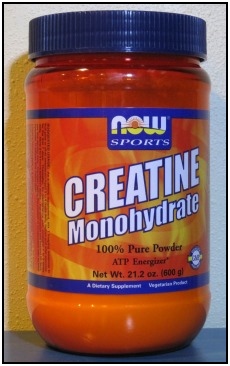Pros and Cons of Creatine:
Should You Use It?
You need to evaluate for yourself the pros and cons of creatine. Will it help you in your sports and activities? Creatine can help you get stronger, but it may also weigh you down.
Weight training is one of the best methods of strength training! If you want to start weight training safely and effectively, with the best info, diet, and routines, check out the 5 Day Beginner Weight Training Course!
Check out the plusses and minuses of creatine below.

- Pros -
◆ Stronger Muscles
Many studies have shown that creatine makes you stronger.[1] In fact, trained athletes' rates of strength increase for their 1RM on the bench press, squat, and power clean were 2-3 times greater for athletes given creatine than for athletes given a placebo.[2]
That is an amazing increase in strength!!!!
◆ Bigger and Heavier Muscles
Extended use of creatine will help you gain more muscle mass.[3] This mass is in the form of water, since creatine helps the muscle cells get bigger and, consequently, they hold more water. Also, creatine causes an increased rate of contractile protein synthesis (one of the things that helps you become stronger).[4]
If you're looking to put on more muscle, this is great. And this gain is all muscle; creatine does not put on fat.
- Cons -
◆ Heavier Muscles
Bigger, stronger muscles are part of the pros and cons of creatine. So, evaluate if you really want heavier muscles.
If you're doing bodybuilding, regular strength training, or martial arts where there aren't weight classes, bigger muscles will probably offer an advantage. But if you do the high jump, pole vault, or something with weight classes, creatine probably isn't a good choice for you.
Weight whether you want to put on more muscle weight.
◆ Strength Increases Are Only For Maximum Efforts
Creatine works best for maximal exertion efforts, such as lifting weights and springing - all of which take less than 30 seconds to do. It doesn't work for endurance exercises.
So if you're a marathon runner, creatine isn't going to help you.
◆ Cost
Creatine costs money. Not a ton - you can easily buy a big jar for about $19.95 or less - but still, it's another expense. And another thing to keep track of.
If you can afford it, go ahead. It will definitely help your training. But it isn't an absolute necessity for putting on more muscle.
◆ Slight Stomach Upset
During the 'loading' phase, the first 5 days of taking creatine where you take more than normal, some people have slight stomach upsets and pass 'gas' more than normal.[5] So, just keep a lookout for that.
There are no documented long-term issues with taking creatine. So, there are some pretty big upsides and almost no health downsides (yet known) from taking creatine.
◆ Time Lag
If you have competition, a big track meet, or any kind of match tomorrow, creatine won't help you. It doesn't work like that.
Creatine helps you put on muscle and lift stronger loads. However, this effect only comes after you've been taking it for a while (at least 5 days) and use it regularly with your training.
Used with your training, it's awesome. But it's not a silver bullet that will immediately boost your ability.
So...
There you have the pros and cons of creatine. But without you starting weight training and working hard in the gym, it'll do no good.
Now weigh whether it's something you want to use in your routine - or can afford not to.
Oh, and be sure to sign up for the e-zine Starting Strong to get monthly strength training, exercise, and diet tips e-mailed to you - and access to the free e-book Train Smart, Eat Smart: Exercise Nutrition Hacks!
• Click here to learn more about The Best Muscle Building Supplement Info!
OR
• Click here to leave 'Pros and Cons of Creatine: Should You Use It?' & go back to the Home-page!
Pros and Cons of Creatine: Should You Use It?
References:
1. Baechle, Thomas R., and Roger W. Earle. 2008. Essentials of Strength Training and Conditioning. Champaign, Ill: Human Kinetics. Pp. 196.
2. Ibid.
3. Benardot, Dan, and Dan Benardot. 2006. Advanced Sports Nutrition. Champaign, IL: Human Kinetics. Pp. 108.
4. Baechle. Pp. 197.
5. Ibid.
Search CST...
|
Tweet Follow @Aaron_CST |
|
"About 2 weeks ago I read all the ab strengthening stuff on your site because I decided I wanted to be strong, instead of having a lot of belly fat. So I started eating healthier, running, exercising, you name it - everything your site said to do to help. Now I am noticing a real difference! Thank you for making this. :D xD" ~ Julia |
|
[This calorie calculator is] the most useful tool on the web that I can find… Also, I compared the calories calculated by your calculator to the calories calculated by the treadmill at my gym, and they're within a couple calories of each other, so yours is as accurate as we're going to get. REALLY AWESOME TOOL. I love it and depend on it. Thank you sooooo much for making this available." ~ Galit Sharon Marcus |
|
Thank you very much, I was too lean before 2 years (55 Kgs), after the gym now I'm 72kgs, all the muscles have developed... when someone hand shakes with me it can be squeezed easily, they're making fun of me! ~ Tamil Arasan |






New! Comments
Have your say about what you just read! Leave me a comment in the box below.